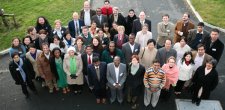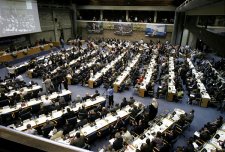By Daniel Barragan (Posted: March 30, 2009)
Las organizaciones socias de la región trabajamos durante el año 2008 en la construcción de un Plan Estratégico de Incidencia para América Latina para los próximos tres años. Este Plan fue presentado, y luego aprobado, por los socios presentes en la Reunión Global TAI realizada en Sligo en octubre de 2008. El principal objetivo de este Plan es el fortalecimiento de la Iniciativa y los socios de la región, para lograr una mayor incidencia tanto en las políticas públicas como en la capacidad de dar mayor visibilidad a las temáticas que trabaja TAI en cada país. Al mismo tiempo este Plan, al ser un proceso regional, permite dar continuidad al trabajo que ya se ha venido realizando en América Latina.
Para cumplir el objetivo propuesto, se plantea la realización de un proceso de capacitación a los miembros de la Iniciativa en el cual adquieran competencias concretas para mejorar sus capacidades de incidencia y las transmitan a los demás integrantes de las coaliciones en cada país.
La estrategia de capacitación se enfocará en saber cómo aumentar la incidencia de la Iniciativa de Acceso (TAI) en la región de América Latina y el Caribe. Particularmente, buscamos compartir experiencias de incidencia que hayan resultado exitosas, con el propósito de obtener indicadores que permitan guiar procesos de incidencia posteriores. Esto a raíz de que, por una parte la evaluación TAI es principalmente un instrumento para incidir; por otra, en la última reunión global TAI realizada en Irlanda, los/as diferentes participantes reconocieron debilidades al momento de incidir en los/as tomadores/as de decisión.
El componente de capacitación de la Estrategia Regional tiene los siguientes objetivos:
Objetivo general:
Empoderar a las organizaciones socias, mediante un proceso de capacitación orientado a mejorar su capacidad de incidencia en los temas de acceso.
Objetivos específicos:
- Identificar y difundir experiencias exitosas de incidencia en temas de acceso, para generar lineamientos que sirvan de guía para el trabajo de las distintas coaliciones en la región.
- Obtener indicadores de eficacia para procesos, necesarios en la realización de actividades de incidencia e identificando también indicadores de mal funcionamiento de estrategias de incidencia con el objeto de no replicarlas.
- Construir una herramienta guía que permita apoyar a los/as socios/as procesos de incidencia necesarios para promover una mejor implementación de los derechos de acceso a nivel nacional y regional.
- Aportar a la generación de conocimiento mediante el uso de las comunidades de prácticas que ofrece el sitio web global de la Iniciativa de Acceso.
Los pasos de la estrategia son los siguientes:
1. Recopilación de información
Como paso inicial, se recopilará información sobre las actividades y acciones de incidencia que hayan tenido resultados exitosos y medibles en el trabajo de los/as socios/as. Para esto se estructurará y circulará una convocatoria de recopilación de experiencias a través del sitio web TAI. Se seleccionarán 4 casos para trabajar durante la jornada.
Además se recopilará y sistematizará un conjunto de herramientas de incidencia, concretas y prácticas, mediante el análisis de los 4 casos de estudio seleccionados de los enviados por los/as socios/as participantes desde diferentes metodologías participativas. . A cada caso seleccionado se le otorgará la suma de $1000 dólares. Estos recursos servirán para que los/as socios/as puedan asignar horas de trabajo para apoyar la construcción de la metodología de análisis a partir de información que se les solicite respecto de los casos seleccionados.
2. Taller de capacitación
Se desarrollará una jornada de capacitación sobre mecanismos de incidencia durante la Reunión Regional que tendrá lugar en Lima, Perú, los días 14 y 15 de julio de 2009, En esta jornada se realizará el análisis de los casos propuestos que permitirá identificar distintos aspectos de incidencia y se buscará responder a las siguientes preguntas:
- ¿Cómo se construyen procesos de cambio social?
- ¿Cuáles son los elementos fundamentales?
- ¿Cómo opera el poder en nuestra sociedad, y cómo podemos incidir a partir de esto? ¿Qué habilidades nos faltan para realizar un proceso de incidencia más eficaz?
- ¿Cómo podemos definir estrategias de incidencia a mediano y largo plazo sin estar solamente respondiendo a la contingencia?, entre otras.
A partir de este trabajo obtendremos los insumos necesarios para la construcción de una herramienta que sirva como guía on-line para los procesos de incidencia de las diferentes coaliciones, la cual será publicada en la página web TAI.
Al mismo tiempo se espera que los representantes de las coaliciones participantes adquieran compromisos concretos como la transferencia de la metodología y algunos otros más, necesarios para el desarrollo eficaz de la estrategia de incidencia en América Latina.
3. Seguimiento
Cada socio asistente tendrá el compromiso de replicar la capacitación en su país , con al menos la asistencia de 2 personas pertenecientes a cada una de las organizaciones de la coalición TAI de su país y/o otras organizaciones sociales de base que trabajen en temáticas y proyectos que sean coherentes con los lineamientos estratégicos de TAI. Durante la jornada de capacitación se trabajará también en la elaboración de propuestas para realizar seguimiento y comunicación/ apoyo constante a los/as socios/as en temas de incidencia.
Los socios de la región pueden acceder a mayor información sobre este proceso, a la convocatoria de experiencias exitosas en Plaza Latina.
The Access Initiative in Latin America and the Caribbean starts the implementation of its Regional Strategy for Advocacy
The partner organizations in the region worked during 2008 on the creation of a Strategic Advocacy Plan for Latin America for the next three years. This Plan was presented and approved by the partners that participated in the TAI Global Gathering held in Sligo, Ireland in October of 2008. The main objective of this Plan is to strengthen the Initiative and the partners in the region, in order to achieve a higher level of outreach, both in terms of public policies and the ability to make the issues with which TAI works in each country more visible. At the same time, as a regional process this Plan allows for continuity in the work that has already been taking place in Latin America.
To fulfill the proposed objective, it is proposed to carry out a training process for members of the Initiative in which they would acquire concrete skills to improve their Advocacy abilities and to be able to transmit this knowledge to other coalition members in each country.
The training strategy will be focused on knowing how to increase the Access Initiative’s (TAI) advocacy in the region of Latin America and the Caribbean. Specifically, we seek to share advocacy experiences that have been successful, in order to obtain indicators that would allow us to guide posterior advocacy processes. As such, on one hand the TAI evaluation is mainly an instrument for advocacy; on the other hand, in the last global TAI meeting held in Ireland, the different participants recognized weaknesses as far as their ability to influence decision makers.
The training component of the Regional Strategy has the following objectives:
General objective: Empowerment of social organizations, through a training process oriented towards improving their advocacy capabilities regarding the issues of access.
Specific objectives:
- Identify and disseminate successful advocacy experiences regarding issues of access, in order to produce baselines that serve as a guide for the work carried out by the different coalitions in the region.
- Obtain indicators for the efficiency of processes, which are necessary when performing outreach activities, and identifying indicators for the poor functioning of advocacy strategies as well, in order to not repeat them.
- Creating a guiding tool that supports our partners with the advocacy processes necessary to promote a better implementation of the rights of access at national and regional levels.
- Contributing to the production of knowledge through the use of practice communities offered by the global web site of the Access Initiative.
The steps of the strategy are the following:
1. Collection of information
As an initial step, information will be collected on the advocacy activities and actions that have had successful and measurable results for the partners that implemented them. To do this, a call to collect experiences will be formed and circulated through the TAI website. Four cases will be selected to work with during this stage.
In addition, a set of concrete and practical advocacy tools will be collected and systematized through the analysis of the 4 case studies selected from those sent by the participating partners, from different participative methodologies. The sum of $1,000 will be granted to each case selected. These resources will help the partners to be able to assign working hours to support the construction of the analysis methodology based on information that will be asked of them regarding the cases selected.
2. Training workshop
A training session on advocacy mechanisms will be held during the Regional Meeting that will take place in Lima, Peru, on July 14 and 15, 2009. In this session, the analysis of the proposed cases that will allow us to identify different aspects of outreach will take place, and we will seek answers to the following questions:
- How are processes of social change constructed?
- What are the fundamental elements?
- How does power operate in our society, and how can we influence its operation? What skills do we lack to be able to carry out a more effective advocacy process?
- How can we define medium and long-term advocacy strategies without just responding to contingency? Etc.
From this work we will obtain the necessary input for the construction of a tool that serves as an on-line guide for the advocacy processes of the different coalitions, which will be published on the TAI web page.
At the same time, it is expected that the representatives of the participating coalitions take on concrete commitments such as the transfer of the methodology, among others, which are necessary for the effective development of the advocacy strategy in Latin America.
3. Follow-up
Each attending partner will take on the commitment to replicate the training in his/her own country, with at least 2 people belonging to each of the organizations participating in that country’s TAI coalition, and/or other grassroots social organizations that work on issues and projects that are on line with the strategic bases of TAI. During the training session, we will also work on the creation of proposals to perform constant follow-up and communication/support for the partners working on issues of advocacy.



